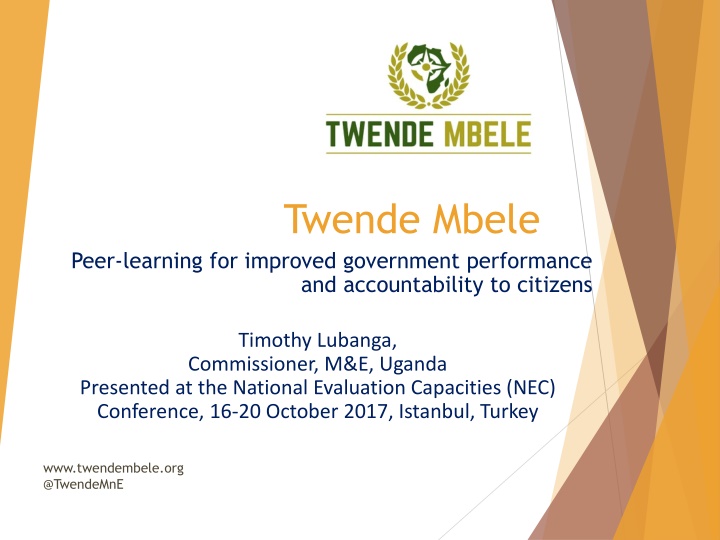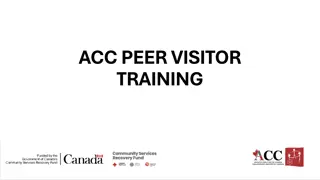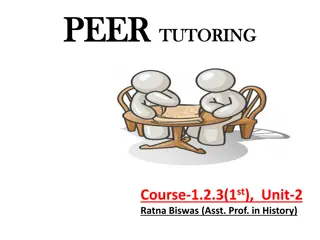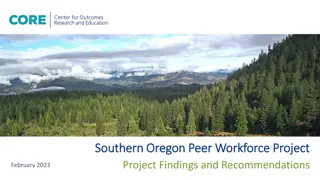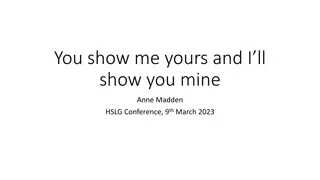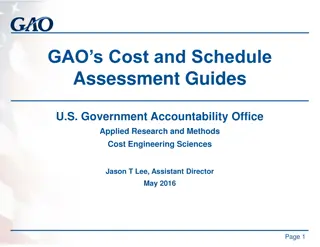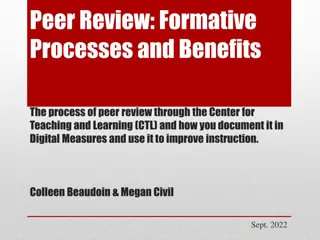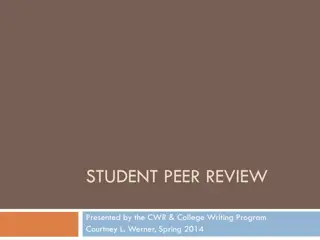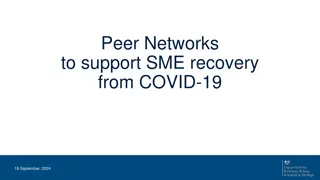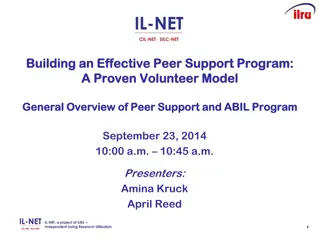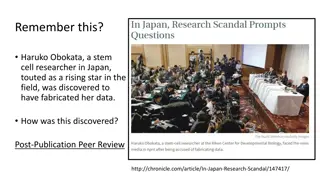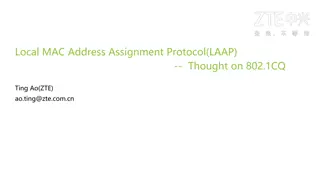Peer-learning for Improved Government Performance and Accountability
This presentation by Timothy Lubanga at the NEC Conference focused on the Twende Mbele initiative, promoting peer-learning among African countries to enhance government performance and accountability through effective monitoring and evaluation systems. The program aims to share experiences, support capacity development, and facilitate collaboration across Africa, ultimately leading to improved governance and citizen engagement.
Download Presentation

Please find below an Image/Link to download the presentation.
The content on the website is provided AS IS for your information and personal use only. It may not be sold, licensed, or shared on other websites without obtaining consent from the author.If you encounter any issues during the download, it is possible that the publisher has removed the file from their server.
You are allowed to download the files provided on this website for personal or commercial use, subject to the condition that they are used lawfully. All files are the property of their respective owners.
The content on the website is provided AS IS for your information and personal use only. It may not be sold, licensed, or shared on other websites without obtaining consent from the author.
E N D
Presentation Transcript
Twende Mbele Peer-learning for improved government performance and accountability to citizens Timothy Lubanga, Commissioner, M&E, Uganda Presented at the National Evaluation Capacities (NEC) Conference, 16-20 October 2017, Istanbul, Turkey www.twendembele.org @TwendeMnE
Background African M&E workshop with 7 countries in March 2012 as result Uganda, Benin and SA started working together on national evaluation systems Attended each others evaluation weeks Participated in training Exchanged standards, competences, guidelines etc Joint session at last Afrea on national eval systems Encouraged Benin to join 3ie DFID agreed to fund going forward, also partnering with CLEAR and AfDB reflecting their regional roles Twende Mbele African M&E Partnership started January 2016, with full funding from 1 September 2016.
Programme Overview 3 core countries (SA, Uganda, Benin plus 2 regional players CLEAR AA and IDEV at the AfDB), expanding to include others These partners are the Management Committee, CLEAR AA hosts the secretariat, and each country has a Country Coordinator DFID funding began in 2015 - 2019 Share experience and support capacity development activities with 10-15 countries Not funding project catalysing learning and sharing and collaboration on M&E across Africa adding value to what you are doing or want to do Country ownership is key principal
Impact Improved performance and accountability of African governments to citizens Wider outcome Effective M&E systems (eg practices, policies, tools and procedures) implemented widely and sustained in partner and other countries with ongoing collaboration across Africa around M&E Immediate Outcome Improved M&E systems (eg practices, policies, tools and procedures) based on shared experience operational in partner countries and more widely Outputs O1 Increased demand to use M&E tools within partner countries and by other governments for improved governance O2 Increased sharing in Africa around use of M&E for improved governance O3 Increased learning in Africa around use of M&E for improved governance O4 Specific M&E practices, policies, tools and procedures developed collaboratively O5 Effective and collaborative programme management, governance and operations 4
Importance of Twende Mbele Country governments coming together to lead on development of national M&E systems Supported by key regional support organisations, CLEAR AA and AfDB Builds on the pioneering work being done by these partners around national evaluation systems What are some of the features of these countries? 5
Current activities Adaptation of Management Performance Assessment Tool in Uganda and Benin Training parliamentarians in M&E Oversight in Ghana, Uganda, Tanzania & Benin Training of Trainers Gender Responsive of NES Performance M&E Culture baseline Peer-review of each others evaluations Adaptation of course on Evidence-based Policy-making National Evaluation Policy workshop at SAMEA conference
The national evaluation systems Item Total number of national evaluations completed or underway as at 31 Dec 2016 Type of evaluations Benin 15 (from 2010) Uganda 23 (from 2008) South Africa 56 (from 2012) 14 implementation/ process evaluations, 1 impact Implementation, 4 process evaluations and 3 impact evaluations 45 implementation (process, some summative), 8 impact, 5 diagnostic, 1 economic (DPME 2017) Mostly government, some support from DFID 32 Source of funds Government in most cases, and donors (UNDP, DANIDA, GIZ) 14 Government and donors (DFID, UNDP and World Bank) 14 Completed evaluation reports 7
Analytical framework of NESs 1 1 2 2 3 3 4 4 5 5 6 6 Alignment planning and budgeting The Evaluation Plan Autonomy and Impartiality POLICY POLICY M vs. E Feedback Selection of indicators Selection criteria Methodologies used METHODOLOGY METHODOLOGY Causality chain Data collection Priority setting Coordination and oversight Decentralised levels Link with projects ORGANISATION ORGANISATION Statistical office Line ministries Problem acknowledged Capacity building plan CAPACITY CAPACITY PARTICIPATION OF PARTICIPATION OF ACTORS OUTSIDE ACTORS OUTSIDE GOVERNMENT GOVERNMENT Parliament Civil society Donors Effective use of M&E Internal usage of M&E findings QUALITY QUALITY 8
Policy Key Questions Is there a national evaluation policy? Comprehensive evaluation plan, indicating what to evaluate? Is need for autonomy and impartiality explicitly mentioned? Benin Uganda South Africa Yes Strategic Evaluation Plan 2013-2015 3 year rolling evaluation agenda in place indicating the sector, topic Policy is very emphatic on independence of evaluations Yes the Plan identifies the importance of high level buy-in in dealing with highly sensitive tough issues Yes, Specific budget vote and items under OPM budget Annual national, 7/9 provincial and emerging 44 departmental plans Strong element of the system, described in the Policy Yes but tendency to start with less challenging ones. Now moving to larger more challenging ones Clearly stated in Eval Policy and Guide for public policies evaluation Yes. But they are not major in the evaluations experienced Does the M&E plan allow for tough issues to be analysed? Is there an independent budget for evaluations? Yes. In the Presidency In DPME for 50% of cost of evaluations 9
Organisation Key Questions Institutional structure for coordination, support, central oversight, and feedback Evaluation/M&E units in line ministries Benin Bureau of Public Policies Evaluation and Government Actions Analysis, Presidency. All line ministries have own M&E system that links to the Ministry of Planning. Uganda Office of PM. National Monitoring South Africa Dept of Planning, M&E overall owner of system. M&E Policy recs creation of M&E Units. OPM working with Ministry of Public Service to establish M&E Units M&E function is performed under the Planning Units. Efforts are underway to have specific evaluation staff M&E Dept relates with donor economists group, and Donor Partnership Forum All national and provincial departments have M&E units. Sector M&E units link vertically. All provinces have M&E units Evaluation/ M&E units at decentralised levels and are these properly linked to central unit? All municipalities have M&E units. Their units are not connected to the national ones. Effort to coordinate with donor M&E mechanisms for projects? There is a platform for that in the Ministry of Planning Donors do not play a big role and so focus is on government. 10
Participation by stakeholders Roles Role of Parliament recognised Benin Now working to develop the collaboration. Uganda Summary of evals undertaken presented to Parl Committee on Budget (PACOB) and Committee on Presidential Affairs. CSOs engaged through National M&E Technical Working Group, evaluation Sub-committee and UEA which works closely with GOU on capacity building and on evaluations South Africa All evaluations sent to relevant committees. Chairs briefed on role of evaluation. Role of civil society Civil Society represented in National Evaluation Board, which plays a role in all evaluations and dissemination of findings Donors funded all evaluations. In some case invited to participate in validation process. No systematic role for civil society although often play a role in steering committees, and stakeholder workshops. Collaboration with SAMEA on aspects of evaluation system. Donors have funded parts of the system but do not participate. Some donor evaluations implemented independently of the system Role of donors Donors engaged through National M&E Technical Working Group, Evaluation Sub-committee, National Partnership Forum, Local Dev Partner Group 11
Focus on use Key Questions How are findings/ recommendation s taken forward? Benin Disseminated at workshops with participation of senior managers. Follow up of use of evaluation findings undertake annually. Improvement plan not yet a reality Uganda Evaluation findings presented to key stakeholders when final report received and to senior management of ministries. Recommen- dations sent formally to implementing agency to take action and follow up made after 12 months Follow up shows between 10-30 % of the evaluation recommendations have been taken up South Africa Management response requested from depts. National Eval Plan evaluations presented to Cabinet. Improvement plans developed and monitored by DPME every 6 months. Nos where high degree of implementation (%) 6/9 (67%). In follow up observe significant implementation of recommendations 9/16 have implemented >25% of recommendations 12
Lessons on peer-learning models Ownership is key activities must be run in line with country-led demand Time to collaborate requires longer timelines Getting people to think and share reflectively required structured time and processes More expensive model than others Need to spread learning beyond one or two champions; this requires running activities in each country and bringing high-level champions from other countries to help build support.
Lessons Importance of central unit in Presidency or Office of Prime Minister mandate to lead evaluation system. They have authority to take system forward. Ensures significant political will to make M&E/evaluation system work, with support from political as well as technical champions Having eval policy in advance (as SA did, but Uganda and Benin didn t) not necessary although there needs to be some definition of how the system will work, how it will provide for impartiality etc, when you start. With severe resource constraints in Africa, all 3 countries strategic in selecting limited numbers of priority evaluations, using donor resources where needed, but driving the agenda themselves. Important if evaluation to become part of countries strategic agendas, not just imposed by donors. 14
Lessons (2) All 3 countries started with national level evaluations focusing on national depts. However, systems extending in SA to provincial levels and to departments, but not yet local government, while Benin is keen to extend to local government levels. 15
Challenges Each country has had a stronger focus on monitoring than evaluation, with some lack of acceptance of / resistance to evaluation. Evaluation often seen as an accountability tool rather than for learning; Funding with evaluation seen as secondary to programme implementation and monitoring and so challenges to liberate funds for evaluation; Capacity of evaluators and government staff hence key focus of Twende Mbele Ensuring that evaluations are followed-up and recommendations implemented. Central agencies play big role in ensuring evaluations implemented successfully. However, responsibility shifts to implementing depts during implementation phase. All three countries are seeking some way to hold these departments to account for implementing the recommendations 16
Conclusions Countries such as Chile and Colombia had national evaluation systems since 1990s. Since the 2010s Benin, Uganda and SA undertaken significant efforts to mainstream evaluations in work of government, in very differing political situations and with differing resource constraints. Systems emerging with wide variety of components policies, plans, standards, governance structures etc, and which involve a wide range of stakeholders in the evaluation ecosystem. In terms of use there is evidence of a significant portion of evaluations having recommendations implemented and we are beginning to see examples of integration with the budget process. Peer learning approach has enhanced these systems, and resources made available through Twende Mbele programme provide an opportunity to deepen this and to expand evaluation to other countries in Africa. 17
